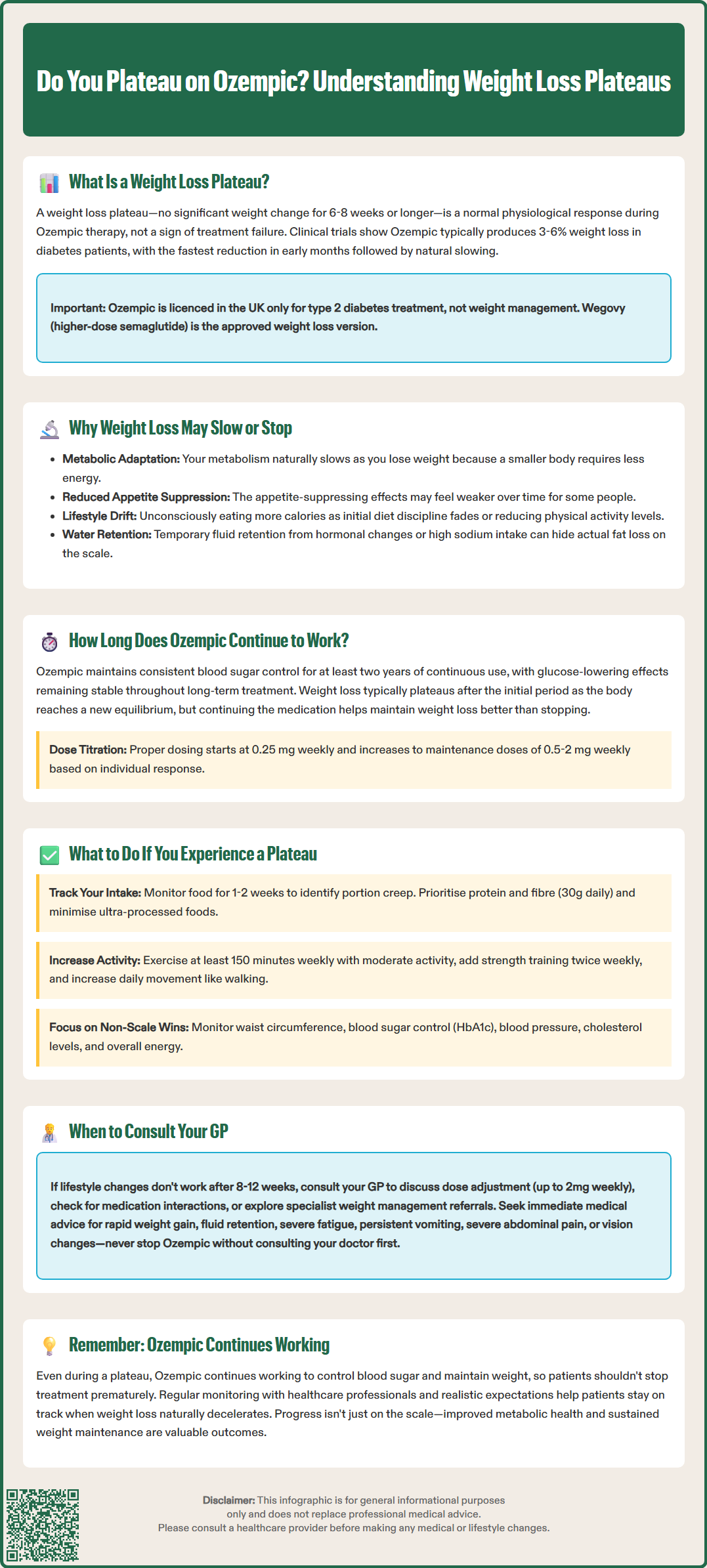
Many patients taking Ozempic (semaglutide) for type 2 diabetes notice their weight loss slows or stops after initial progress—a phenomenon known as a plateau. Whilst Ozempic is licensed in the UK solely for diabetes management (not weight loss), weight reduction is a common secondary benefit. Understanding why plateaus occur, how long Ozempic remains effective, and what strategies can help is essential for managing expectations and optimising treatment outcomes. This article explores the science behind weight plateaus, distinguishes normal metabolic adaptation from treatment failure, and provides evidence-based guidance aligned with NHS and NICE recommendations.
Quick Answer: Weight loss plateaus on Ozempic are common and normal, typically occurring after initial months of treatment as the body adapts metabolically, but the medication continues providing glycaemic control benefits.

Mounjaro® is the most innovative GLP-1 medication proven to dramatically curb appetite, hunger, and cravings to help professional men achieve substantial weight loss.
Start Here
Wegovy® is a weekly injectable GLP-1 medication with proven effectiveness in reducing appetite, hunger, and cravings to help busy professionals lose significant weight.
Start HereOzempic (semaglutide) is a glucagon-like peptide-1 (GLP-1) receptor agonist licensed in the UK for the treatment of type 2 diabetes mellitus. It is important to note that Ozempic is not licensed for weight management in the UK, although many patients experience weight reduction as a secondary benefit of treatment. Wegovy (semaglutide 2.4mg) is the specifically licensed version for weight management, available through specialist services under NICE guidance (TA875).
A weight loss plateau—defined as a period where weight remains stable despite continued medication use—is a commonly reported phenomenon that can occur at various stages of Ozempic therapy. While there is no standardised definition, clinicians typically consider a plateau as no significant weight change for 6-8 weeks or longer.
Weight loss plateaus are a normal physiological response and do not necessarily indicate treatment failure or medication resistance. Clinical trials from the SUSTAIN programme show that patients on Ozempic for type 2 diabetes typically experience weight loss of approximately 3-6% of their baseline weight, with the most rapid reduction often occurring during the initial months of treatment, followed by a natural slowing.
It is important to distinguish between a true plateau and the natural deceleration of weight loss that occurs as the body adapts to a lower weight. Understanding that plateaus are common can help manage expectations and prevent premature discontinuation of effective treatment.
Patients should be reassured that experiencing a plateau does not mean Ozempic has stopped working entirely. The medication continues to provide glycaemic control benefits and may still support weight maintenance, even when active weight loss has slowed. Regular monitoring and realistic goal-setting with healthcare professionals remain essential throughout the treatment journey.

Several interconnected physiological and behavioural factors contribute to weight loss plateaus during Ozempic treatment. Understanding these mechanisms can help patients and clinicians develop appropriate strategies to address them.
Metabolic adaptation is perhaps the most significant factor. As body weight decreases, the body's basal metabolic rate (BMR) naturally declines because less energy is required to maintain a smaller body mass. Additionally, the body may activate compensatory mechanisms that reduce energy expenditure and increase hunger signals—an evolutionary response designed to prevent excessive weight loss. Research suggests this adaptive thermogenesis can reduce energy expenditure, though the magnitude varies considerably between individuals.
Some patients report that the appetite-suppressing effects of semaglutide seem less pronounced over time, though evidence for true pharmacological tolerance to GLP-1 receptor agonists remains limited. The medication continues to provide glucose-lowering effects long-term, but individual variation in subjective appetite suppression is well documented.
Lifestyle factors frequently contribute to plateaus. Patients may unconsciously increase caloric intake as initial dietary vigilance wanes, or physical activity levels may decrease. Very low-calorie diets, which some patients may adopt initially due to reduced appetite, should only be followed under clinical supervision as they can trigger metabolic slowdown and are generally not sustainable long-term.
Fluid retention and body composition changes can mask ongoing fat loss. Hormonal fluctuations, medication changes, and increased sodium intake can cause temporary water retention that obscures fat loss on the scales. Measurement consistency (same time of day, clothing, etc.) is important for accurate tracking. While some patients may gain muscle mass through increased activity, this effect is typically modest without dedicated resistance training.
Ozempic maintains its therapeutic efficacy for glycaemic control throughout long-term treatment, with SUSTAIN clinical trials demonstrating sustained HbA1c reductions for at least two years of continuous use. The medication's glucose-lowering effects—mediated through glucose-dependent insulin secretion, suppressed glucagon release, and delayed gastric emptying—remain consistent with ongoing treatment, provided patients maintain adherence to their prescribed regimen.
Regarding weight management effects, the trajectory typically follows a predictable pattern, though this varies between individuals. Weight tends to stabilise after the initial period of loss, representing a new equilibrium point where energy intake matches expenditure at the lower body weight. Clinical trial data show that patients who continue semaglutide maintain their weight loss significantly better than those who discontinue, with weight regain commonly observed after stopping treatment (as demonstrated in the STEP-4 trial for higher-dose semaglutide).
The duration of perceived appetite-suppressing effects varies considerably between individuals. Some patients report sustained reduction in hunger and food cravings throughout treatment, whilst others notice these effects diminish somewhat over time. However, even when subjective appetite suppression lessens, the medication continues to provide metabolic benefits.
Dose optimisation plays a crucial role in sustained efficacy. Ozempic is typically initiated at 0.25 mg weekly and titrated to a maintenance dose of 0.5 mg or 1 mg weekly. Some patients may benefit from the maximum licensed dose of 2 mg weekly (as per the UK SmPC) if lower doses prove insufficient for glycaemic control. For patients whose primary treatment goal is weight reduction rather than diabetes control, Wegovy (semaglutide 2.4 mg weekly) may be more appropriate, though this requires specialist referral and must meet NICE criteria (TA875). Patients should discuss dose adjustments with their prescribing clinician rather than making changes independently.
Experiencing a weight loss plateau whilst taking Ozempic warrants a systematic, evidence-based approach rather than immediate treatment changes. The following strategies can help patients navigate this common challenge.
Reassess dietary intake and quality. Even with appetite suppression, caloric intake may gradually increase over time. Patients should consider:
Maintaining a food diary for 1–2 weeks to identify unconscious increases in portion sizes or snacking
Focusing on adequate protein intake to support muscle maintenance
Ensuring adequate fibre intake (30 g daily as per NHS guidance) to support satiety and metabolic health
Limiting ultra-processed foods, which may override satiety signals
Optimise physical activity levels. The UK Chief Medical Officers recommend at least 150 minutes of moderate-intensity activity weekly plus strength activities on at least 2 days per week. Patients experiencing plateaus should consider:
Incorporating resistance training to support metabolic health
Increasing daily non-exercise activity through walking, standing, and general movement
Finding enjoyable activities that can be maintained long-term
Review medication regimen with your GP or diabetes specialist. If lifestyle optimisation proves insufficient, clinical review may identify:
Whether dose titration (up to 2 mg weekly for Ozempic) is appropriate for glycaemic control
Potential medication interactions that may affect weight
Whether referral to specialist weight management services (Tier 3) for consideration of Wegovy might be appropriate
Underlying medical conditions affecting weight, such as hypothyroidism or polycystic ovary syndrome
Monitor non-scale victories and body composition changes. Weight alone does not reflect treatment success. Patients should track:
Waist circumference measurements (more indicative of metabolic health than total weight)
Improvements in glycaemic control (HbA1c, fasting glucose)
Changes in cardiovascular risk markers (blood pressure, lipid profile)
Enhanced physical function, energy levels, and quality of life
When to seek medical advice: Contact your GP or diabetes team if you experience rapid or persistent unexplained weight gain, signs of fluid retention, new or worsening symptoms such as severe fatigue, persistent vomiting, severe abdominal pain, or visual changes (particularly if you have diabetic retinopathy). Do not stop taking Ozempic without medical advice unless you experience severe adverse effects requiring urgent care. If you experience suspected side effects, report them through the MHRA Yellow Card scheme. A plateau lasting beyond 8–12 weeks despite lifestyle optimisation warrants clinical review to reassess treatment goals and explore alternative strategies.
Most patients experience the most rapid weight loss during the initial months of Ozempic treatment, with weight typically stabilising after this period. A plateau is generally considered as no significant weight change for 6–8 weeks or longer, though timing varies considerably between individuals.
No, Ozempic continues to provide effective glycaemic control even when weight loss slows or stops. Clinical trials demonstrate sustained HbA1c reductions for at least two years of continuous treatment, with the medication's glucose-lowering effects remaining consistent throughout long-term use.
Dose adjustments should only be made following discussion with your GP or diabetes specialist. Ozempic can be titrated up to a maximum of 2 mg weekly for glycaemic control, but dose changes must be clinically appropriate and should not be made independently by patients.
All medical content on this blog is created based on reputable, evidence-based sources and reviewed regularly for accuracy and relevance. While we strive to keep content up to date with the latest research and clinical guidelines, it is intended for general informational purposes only.
DisclaimerThis content is not a substitute for professional medical advice, diagnosis, or treatment. Always consult a qualified healthcare professional with any medical questions or concerns. Use of the information is at your own risk, and we are not responsible for any consequences resulting from its use.